Tim Ronaldson – Naas, Kildare
Over the past couple of months, readers may have noticed Tim’s absence in the From the Tramlines programme.
On 20 August, Tim was in a very serious farm accident involving livestock. He suffered serious injuries to his head after being kicked by a bull.
As his doctor explained, everything was broken except for the important parts, ie his brain and skull. Thankfully, after multiple operations and an intensive recovery period, Tim is back to near full health and he returns to the programme this week.

Tim's Tayo hybrid rye was sown on 24 September.
One thing which was clear when talking to him earlier this week, community spirit in Ireland is still alive and well. The accident occurred just as the settled spell of weather arrived for the winter wheat and spring barley harvest. His son Mark then took over all operations on the farm and was inundated with help from neighbours, friends and dealers to ensure the harvest was completed.
Autumn sowing
They are nearly finished with autumn sowing. The weather this autumn has been exceptional in Kildare and ground conditions are fantastic.
This season they are using contractors to plough ahead. Mark is drilling the crops and Tim is applying pre-emergence herbicides. They started with Tayo hybrid winter rye, drilling at a rate of 70kg/ha. They rolled the ground twice in order to prevent slug damage. They then moved on to winter barley, sowing the varieties Joyau (198kg/ha), Valerie (225kg/ha), LG Castings (190kg/ha) and Belfry (100kg/ha). All crops were treated pre-emergence with Naceto (0.45l/ha).
At the start of October, they moved on to sowing winter wheat, sowing Costello (155kg/ha) and Graham (165kg/ha). The crops were treated pre-emergence with Roxy (2l/ha) and DFF (0.2l/ha). Finally, they sowed Isabel oats at 165kg/ha. The crop hasn’t received a herbicide yet.
Harvest
Tim’s crops performed well this year due to good yield and prices. He grew malting barley for the first time this year. It yielded 3t/ac and it all passed for malting. He says this is a new venture for him and he intends to grow it again next year.
John Crowley – Mallow, Cork
Conditions have been reasonably good on John’s farm.
While there has been some rain this week, ground trafficability is still good and he should be finished sowing this week.

John will be finished sowing this week.
Temperatures are very mild, however. On Wednesday of this week, temperatures reached 19.4°C. Growth has been exceptional but the risk of BYDV from aphids is high, he says.
John ploughed all of his winter cereal ground around three weeks ago so once he started sowing, he had a clear run. He started sowing winter barley on 1 October.
This year he is sowing the varieties Infinity, Cosmos and Cassia. These varieties perform well on his farm and have good straw strength, which is important for him.
He is also trying the new variety Tardis this year. All crops were sown at a rate of around 180kg/ha and he trialled a new trailed Kuhn Espro when sowing.
The crops were sown in two lots. The earlier sown crops were sown in stickier conditions and weren’t rolled. The later-sown crops were sown in very good conditions and were rolled.
Next he moved on to sowing winter wheat. Once again he is sowing the variety Graham.
The crop was drilled at a rate of 180kg/ha. Finally he moved on to the Husky oats, sown at 172kg/ha.
John has opted for a post-emergence strategy. At the two- to three-leaf stage he intends on applying Defy and DFF on to his winter barley crops. He intends to add in an aphicide with this spray.
John says he had a crop of winter barley badly affected by BYDV a number of years ago when it wasn’t sprayed with an aphicide during a similar high-pressure year.
He thinks he will apply Alistair next March on his winter wheat crops and is considering adding in DFF to help knock out chickweed.
John is also moving straw and grain and this will continue into the winter. He says he would normally buy in fertiliser at this time of the season but has been unable to this year.
Seamus Duggan – Durrow, Laois
There has been virtually no rain in Laois over the past few weeks, says Seamus. Like most areas, temperatures have been unseasonably mild in his area this week, with temperatures reaching 20°C on Wednesday.
Ground conditions are excellent so there have been no issues with ploughing, sowing or spreading slurry this season.
“We were able to spread our slurry in super conditions. We really felt we were getting the value of it this year,” he says.
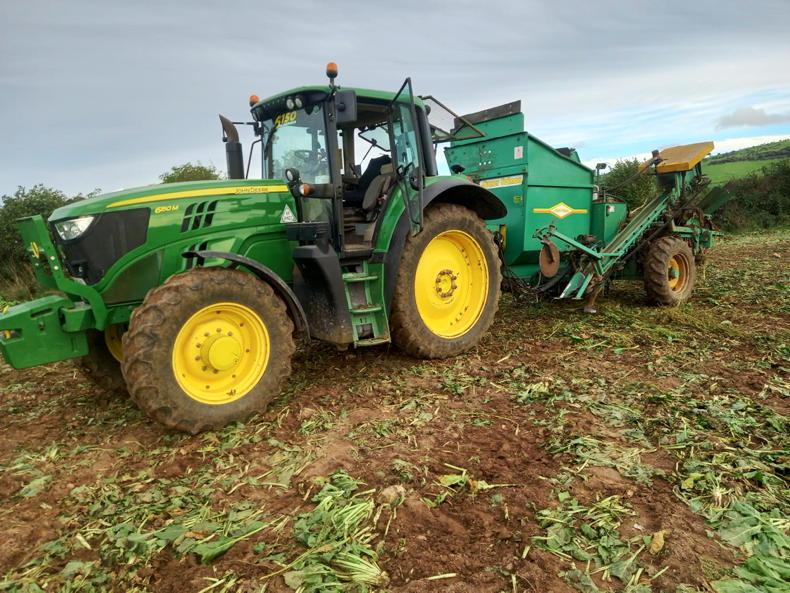
Seamus started harvesting beet this week.
When talking to Seamus this week, he had a small amount of winter barley left to sow. The crop is going to be drilled in to a field where a local ploughing match was held at the weekend. He says it’s great to be back out a ploughing matches.
Winter barley
This year he is growing the varieties Vessel, sown at 180kg/ha and Electrum, sown at 168kg/ha. He is also sowing a new trial variety this year, Faye, sown at 180kg/ha. All varieties are being sown for malting.
Ground is very dry so Seamus rolled his ploughed ground with the paddles down prior to drilling.
He then rolled again with the paddles up after sowing.
He opted for a pre-emergence strategy this year due to the good conditions. However if the weather breaks, he said he will wait and apply a post-emergence spray instead. He intends on applying an aphicde this autumn. He says temperatures are so high that aphids have to be active.
Beet
His 2021 beet harvest has started this week. He lifted around 5ac of Enermax beet as a number of customers were looking to get started on their autumn feeding programmes. Seamus thinks the crops are still growing so he only wants to lift a small amount for now.
The crop yielded 27t/ac and this will keep his customers going for a couple of weeks. He harvests beet with the help of contractors Larry Whyte and Pat Doheny who use two single-row Armer Salmon harvesters.

Tim Ronaldson – Naas, Kildare
Over the past couple of months, readers may have noticed Tim’s absence in the From the Tramlines programme.
On 20 August, Tim was in a very serious farm accident involving livestock. He suffered serious injuries to his head after being kicked by a bull.
As his doctor explained, everything was broken except for the important parts, ie his brain and skull. Thankfully, after multiple operations and an intensive recovery period, Tim is back to near full health and he returns to the programme this week.

Tim's Tayo hybrid rye was sown on 24 September.
One thing which was clear when talking to him earlier this week, community spirit in Ireland is still alive and well. The accident occurred just as the settled spell of weather arrived for the winter wheat and spring barley harvest. His son Mark then took over all operations on the farm and was inundated with help from neighbours, friends and dealers to ensure the harvest was completed.
Autumn sowing
They are nearly finished with autumn sowing. The weather this autumn has been exceptional in Kildare and ground conditions are fantastic.
This season they are using contractors to plough ahead. Mark is drilling the crops and Tim is applying pre-emergence herbicides. They started with Tayo hybrid winter rye, drilling at a rate of 70kg/ha. They rolled the ground twice in order to prevent slug damage. They then moved on to winter barley, sowing the varieties Joyau (198kg/ha), Valerie (225kg/ha), LG Castings (190kg/ha) and Belfry (100kg/ha). All crops were treated pre-emergence with Naceto (0.45l/ha).
At the start of October, they moved on to sowing winter wheat, sowing Costello (155kg/ha) and Graham (165kg/ha). The crops were treated pre-emergence with Roxy (2l/ha) and DFF (0.2l/ha). Finally, they sowed Isabel oats at 165kg/ha. The crop hasn’t received a herbicide yet.
Harvest
Tim’s crops performed well this year due to good yield and prices. He grew malting barley for the first time this year. It yielded 3t/ac and it all passed for malting. He says this is a new venture for him and he intends to grow it again next year.
John Crowley – Mallow, Cork
Conditions have been reasonably good on John’s farm.
While there has been some rain this week, ground trafficability is still good and he should be finished sowing this week.

John will be finished sowing this week.
Temperatures are very mild, however. On Wednesday of this week, temperatures reached 19.4°C. Growth has been exceptional but the risk of BYDV from aphids is high, he says.
John ploughed all of his winter cereal ground around three weeks ago so once he started sowing, he had a clear run. He started sowing winter barley on 1 October.
This year he is sowing the varieties Infinity, Cosmos and Cassia. These varieties perform well on his farm and have good straw strength, which is important for him.
He is also trying the new variety Tardis this year. All crops were sown at a rate of around 180kg/ha and he trialled a new trailed Kuhn Espro when sowing.
The crops were sown in two lots. The earlier sown crops were sown in stickier conditions and weren’t rolled. The later-sown crops were sown in very good conditions and were rolled.
Next he moved on to sowing winter wheat. Once again he is sowing the variety Graham.
The crop was drilled at a rate of 180kg/ha. Finally he moved on to the Husky oats, sown at 172kg/ha.
John has opted for a post-emergence strategy. At the two- to three-leaf stage he intends on applying Defy and DFF on to his winter barley crops. He intends to add in an aphicide with this spray.
John says he had a crop of winter barley badly affected by BYDV a number of years ago when it wasn’t sprayed with an aphicide during a similar high-pressure year.
He thinks he will apply Alistair next March on his winter wheat crops and is considering adding in DFF to help knock out chickweed.
John is also moving straw and grain and this will continue into the winter. He says he would normally buy in fertiliser at this time of the season but has been unable to this year.
Seamus Duggan – Durrow, Laois
There has been virtually no rain in Laois over the past few weeks, says Seamus. Like most areas, temperatures have been unseasonably mild in his area this week, with temperatures reaching 20°C on Wednesday.
Ground conditions are excellent so there have been no issues with ploughing, sowing or spreading slurry this season.
“We were able to spread our slurry in super conditions. We really felt we were getting the value of it this year,” he says.

Seamus started harvesting beet this week.
When talking to Seamus this week, he had a small amount of winter barley left to sow. The crop is going to be drilled in to a field where a local ploughing match was held at the weekend. He says it’s great to be back out a ploughing matches.
Winter barley
This year he is growing the varieties Vessel, sown at 180kg/ha and Electrum, sown at 168kg/ha. He is also sowing a new trial variety this year, Faye, sown at 180kg/ha. All varieties are being sown for malting.
Ground is very dry so Seamus rolled his ploughed ground with the paddles down prior to drilling.
He then rolled again with the paddles up after sowing.
He opted for a pre-emergence strategy this year due to the good conditions. However if the weather breaks, he said he will wait and apply a post-emergence spray instead. He intends on applying an aphicde this autumn. He says temperatures are so high that aphids have to be active.
Beet
His 2021 beet harvest has started this week. He lifted around 5ac of Enermax beet as a number of customers were looking to get started on their autumn feeding programmes. Seamus thinks the crops are still growing so he only wants to lift a small amount for now.
The crop yielded 27t/ac and this will keep his customers going for a couple of weeks. He harvests beet with the help of contractors Larry Whyte and Pat Doheny who use two single-row Armer Salmon harvesters.








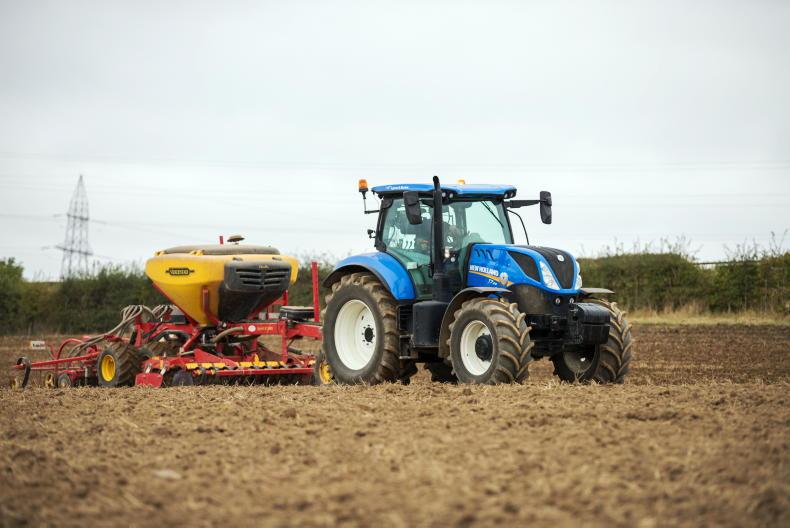

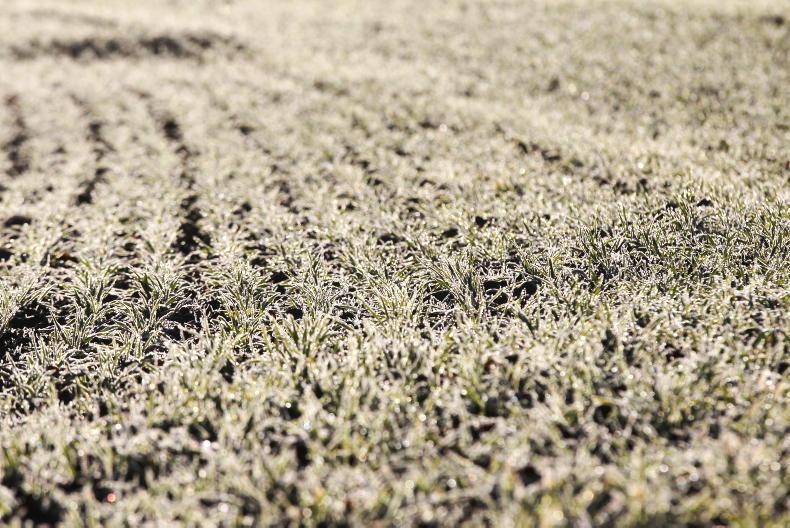

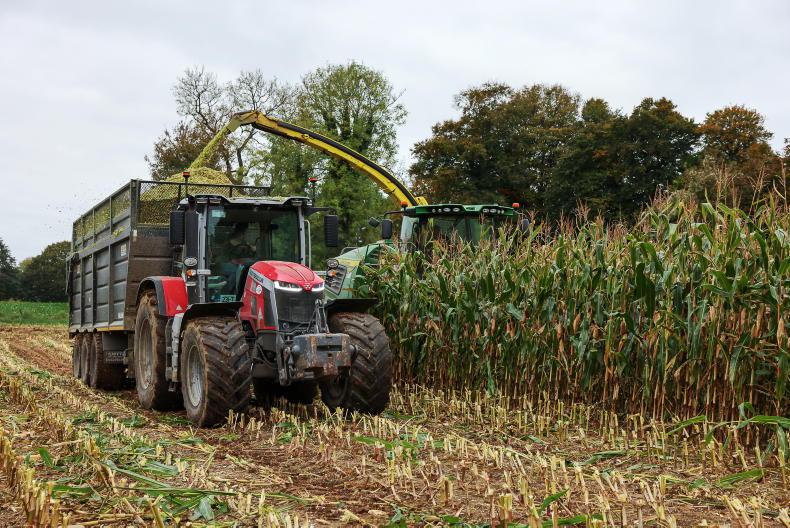
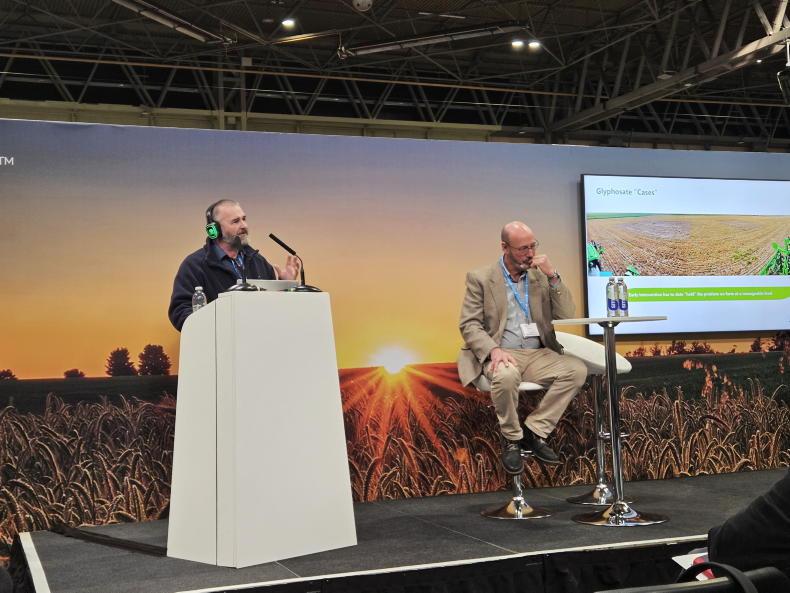
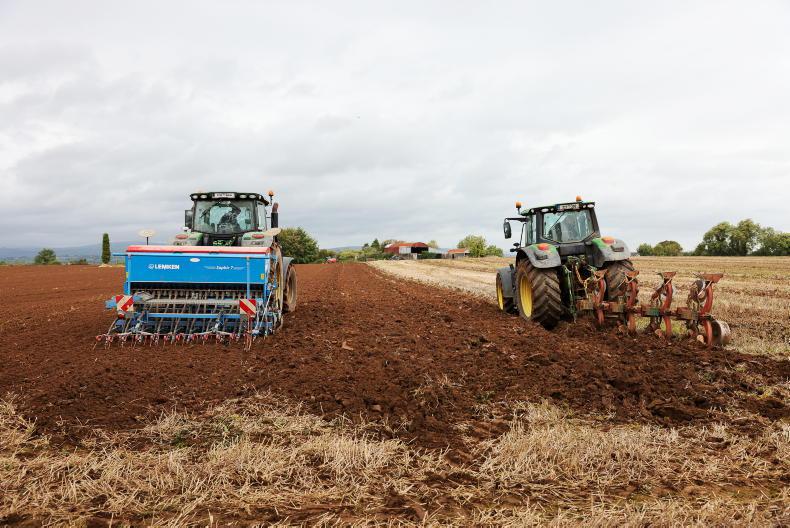
SHARING OPTIONS